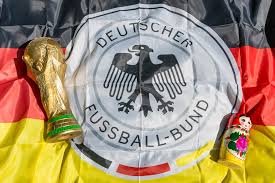By Samuel A. June 14, 2024
Host Germany kicked off Euro 2024 in spectacular fashion on Friday, hammering 10 man Scotland 5-1 in Munich to record the biggest opening match victory in European Championship history. First half goals from Florian Wirtz, Jamal Musiala and Kai Havertz put the result beyond doubt early on, before Niclas Füllkrug and Emre Can, who wasn’t even in the squad 48 hours ago, added gloss to the score line in the second period. Antonio Rüdiger’s own goal in the 87th minute was nothing more than a consolation but gave the Scotland fans a moment to remember on a difficult night.
The Scottish men were dealt a double blow at the end of the first half when Ryan Porteous was shown a red card for a horrific lunge on İlkay Gündoğan, which also resulted in a penalty and Havertz’s goal. The result – but more importantly, the dominant nature of Germany’s performance – will likely be a significant boost for their fans, who largely didn’t have high hopes for their national team at these home Euros.
There will certainly be tougher tests ahead, including against Hungary and Switzerland in the group, but Germany couldn’t have wished for a more straightforward and encouraging start.
“I’m happy, I’m satisfied,” manager Julian Nagelsmann said after the game. “It’s not easy the first game when you’re the home country. The first 20 minutes, we did brilliantly, good possession and counter pressing. We conceded one goal, but in the end, it’s okay.”
It took just 10 minutes for Germany to find a way through Scotland’s defense as Wirtz’s first time finish from the edge of the area capped a sweeping team move.
It was the kind of clinical finish German fans have come to expect from Wirtz after a stunning season for Bundesliga champion Bayer Leverkusen, ending the campaign with 18 goals and 20 assists in all competitions. Just eight minutes later, it was 2-0. This time, it was a piece of magic from Gündoğan that unlocked Scotland’s backline, turning on a dime before threading a pinpoint through ball into Havertz, who found Musiala for a thumping finish.
Things then looked to have gone from bad to worse for Scotland when Germany was awarded a penalty, but the Tartan Army behind the goal was given a reprieve when the VAR ruled Ryan Christie’s foul on Musiala was outside of the area.
Scotland was offering next to nothing as an attacking threat and the first half was quickly beginning to resemble a training session as Germany passed the ball around with ease. Any semblance of the match being a contest was ended just before half time when Porteous was shown a straight red card for his wild lunge on Gündoğan, which also resulted in a Germany penalty that Havertz converted with nonchalance.
There were a few stoic renditions of ‘Flower of Scotland’ that echoed around the Allianz Arena in the second half, but substitute Füllkrug’s stunning finish into the top corner promptly silenced the Scottish enthusiasm in the stands. Scotland did come away with a moment to remember just three minutes from time when substitute Scott McKenna headed Andy Robertson’s long free kick towards goal, taking a deflection off Rüdiger and nestling in the back of the net.
Germany, however, didn’t allow Scotland fans much time to enjoy their moment as Can, who was a late callup following youngster Aleksandar Pavlović’s injury, found the bottom corner from the edge of the area. The thumping win will be a considerable boost to a team that didn’t come into its home tournament with high expectations.
Poor form and performances led to the federation sacking head coach Hansi Flick in September 2023 and bringing in Nagelsmann, who has also struggled to consistently find results. The national team hasn’t won a knockout match at a major tournament in almost eight years, getting knocked out at the group stages of the two previous World Cups and losing in the round of 16 at Euro 2020.
But after Germany’s performance on Friday, some fans might now be dreaming of a second ‘summer fairytale’ – a term given to the summer of 2006 when Germany unexpectedly reached the semifinals of the World Cup on home soil when expectations were similarly low.



